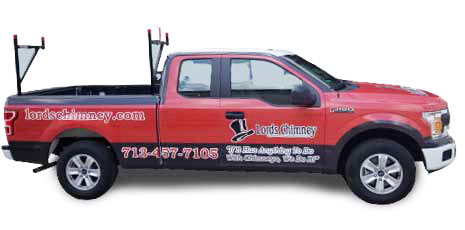We’re Chimney Animal & Nest Removal Experts
Birds, squirrels, raccoons, and other animals sometimes nest in chimneys and cause problems such as noise, smell, and disease. These problems are exacerbated if one tries to “smoke the animal out” and the animal dies in the chimney. At Lords Chimney, we’ve never met an animal—dead or alive—that we couldn’t remove. It’s important to have animal nests removed from your chimney not only because of the bothersome sounds and smells they create but because these nests are fire hazards and can affect how your chimney drafts.
If you have a live animal in your chimney, one of our chimney technicians can usually coax it out from behind the damper, but it may need to be removed manually or with specialized tools. In prefabricated fireplaces, animals sometimes are located in areas other than the flue, and this requires specialized removal techniques.
There is, however, one animal that we cannot remove by law. The “chimney swift” is a small, dark, mosquito-eating bird that sticks its nest to the side of flues using its saliva. Nesting almost entirely in chimneys, chimney swifts are often mistaken for bats. Protected by law, nests of chimney swifts cannot be removed until after the eggs and birds are gone. There is a fine of up to $15,000 and a six-month jail penalty for removing active nests. If you have an active chimney swift nest, we suggest a process of sealing off the front of the fireplace with wood or other isolative barriers. This will help reduce the sound and smell that can come into the home from the chimney swift nest. Once nesting season is over, this remediation system can be removed, and we can clean, inspect, and install a chimney cap to prevent future nesting.
Although we are skilled at removing animals from chimneys, it’s important to prevent animals from entering in the first place. You can prevent birds and animals from entering your chimney with chimney caps or covers and steel screening
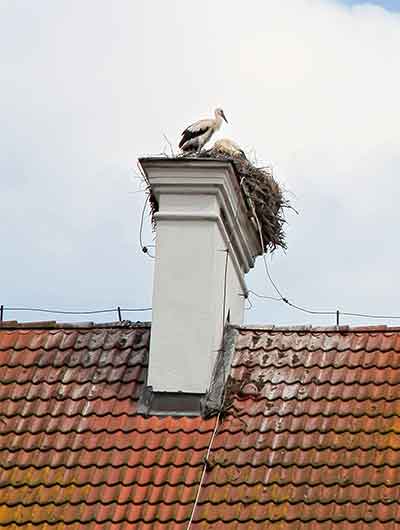
Bird’s Nest on Chimney
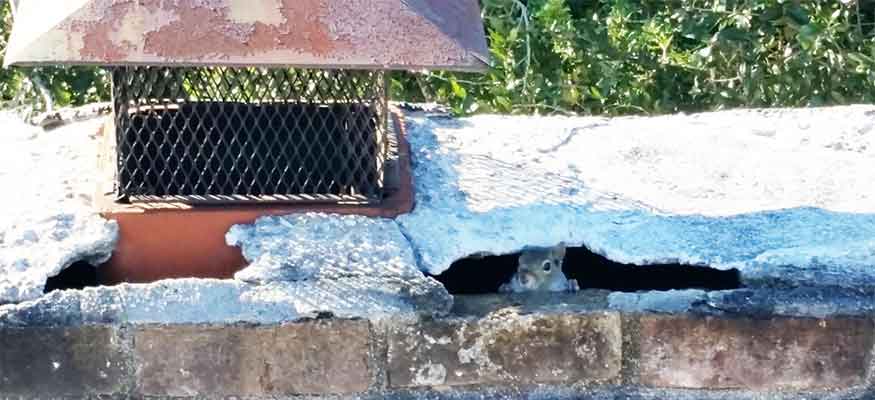
Squirrel in Chimney
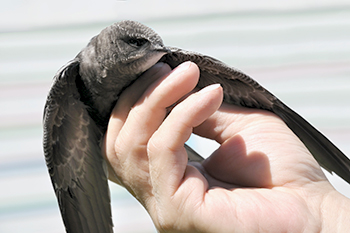
Chimney Swift
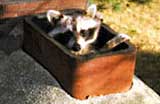
Raccoon in Chimney
Why Chimney Swifts Matter
Though many homeowners are peeved that chimney swifts call their chimneys home, these migratory birds are pretty great in that they eat nearly one third of their own weight in flying insect pests such as mosquitoes, biting flies, and termites every day. Their aerial acrobatics are also delightful to watch. Just like purple martins, chimney swifts nest almost exclusively in man-made structures. They once used large, hollow trees to nest and roost, but as most ancient forests have been razed they now look to chimneys for nest sites. Chimney swifts cannot perch like songbirds; that’s why they have to have deep shafts to raise their families and roost at night.
Chimney swifts are now protected by law because they are declining in numbers. For that reason you should never hire a chimney company that openly advertises “bird removal.”
Having your chimney cleaned in early spring and making sure that your chimney is properly capped can help prevent chimney swifts from nesting in your chimney in the first place. However, if you don’t mind hosting these protected birds, be sure to keep the top of your chimney opened and your damper closed from March to October. This will provide them with a safe haven without infiltrating your air and sound quality.
How Long Will They Nest?
Chimney swifts typically incubate their eggs for a little under three weeks. Once the eggs hatch, the babies are fed by their parents for about a month. During this time, they go through different stages of development, until they are ready to try flying. Once they master flying, they will typically still return to their nest for the first few days – but as fall makes its first appearance, the chimney swifts will leave your chimney and head back down south.
What Can I Do About Wasps in My Chimney?
Wasps in chimneys and fireplaces, though less common than animals like birds or raccoons, can be a nuisance. Here’s the good news – while not recommended in any other animal-invasion scenario, lighting a fire can effectively drive them out, as the smoke deters them.
After the wasps are gone, though, removing the nest is crucial to prevent chimney fires since the nest material is highly flammable. In addition, nests and any kind of buildup can mess with drafting and airflow, which affects efficiency and puts your home at risk. Because of this, a professional inspection from our team should follow any wasp evacuation to ensure there are no hidden issues and that the chimney is safer for future use.
Then, to prevent future infestations, we can install a quality chimney cap or possibly a top-sealing damper, as well as repair any cracks in the chimney’s masonry or mortar. Keeping common wasp attractors, such as bird feeders or trash cans, away from the chimney area can also help.
Book Your Chimney Animal Removal Services With Us
If you live in the greater Houston area and need animal or nest removal, or if you’d like to know more about how to prevent animals from entering your chimney, please give us a call at 281-497-4000. You can also contact us using our convenient appointment request form!
Here at Lords Chimney, you can count on our chimney sweepings and cleanings to be thorough and to done right.

